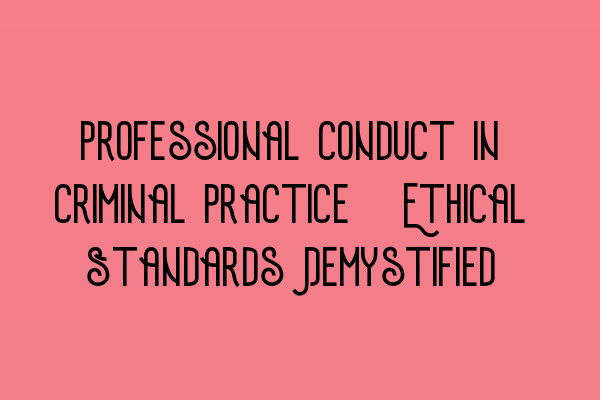Professional Conduct in Criminal Practice: Ethical Standards Demystified
Welcome to SQE Criminal Law & Practice Law UK! As a professional solicitor, writer, and SEO expert, it is my pleasure to present you with this blog post on professional conduct in criminal practice. In this article, we will delve into ethical standards, providing you with a comprehensive understanding of the principles and guidelines that govern the legal profession.
Understanding Professional Conduct in Criminal Practice
Professional conduct refers to the ethical behavior expected from legal professionals in their day-to-day practice. In the realm of criminal law, solicitors and lawyers hold a vital role in upholding justice and ensuring fair trials for their clients. It is crucial for legal professionals to maintain high ethical standards to preserve the integrity of the legal system.
One of the key aspects of professional conduct is the duty to act in the best interests of the client. Legal professionals must provide competent representation, keeping the client’s needs and wishes at the forefront of their actions. This duty also encompasses maintaining client confidentiality and avoiding conflicts of interest.
Another pivotal element of ethical conduct is the duty to the court. Solicitors and lawyers must act with honesty and integrity, presenting accurate information to the court and avoiding any behavior that may undermine the administration of justice. This duty extends to providing full disclosure of relevant facts and evidence, even if it may not favor the client’s case.
Now that we have discussed the foundational principles of professional conduct, it is important to explore specific scenarios where ethical dilemmas may arise.
Ethical Challenges and How to Address Them
In criminal practice, legal professionals often face challenging situations that require careful navigation of ethical boundaries. One such challenge is the duty to zealously advocate for the client while maintaining honesty and integrity.
It is crucial to strike a balance between vigorously representing the client’s interests and acting ethically. Legal professionals should refrain from engaging in dishonest tactics or presenting false information to the court. Instead, they can focus on highlighting the strengths of their client’s case and challenging the prosecution using legitimate legal strategies.
Confidentiality is another crucial aspect of professional conduct. Legal professionals must maintain strict confidentiality regarding client information, barring any exceptions mandated by law or in exceptional circumstances where disclosure is necessary to prevent harm.
Furthermore, conflicts of interest may arise in criminal practice, particularly when representing multiple clients who possess conflicting interests. In such situations, legal professionals must prioritize their clients’ interests and avoid any potential harm to their clients due to conflicting obligations. If conflicts cannot be resolved, solicitors and lawyers must withdraw representation to maintain ethical standards.
Continuing Professional Development and Professional Conduct
As legal professionals, it is essential to stay abreast of changes in professional conduct regulations and ethical standards. The Solicitors Regulation Authority (SRA) oversees the conduct of solicitors in England and Wales and provides guidance on ethical issues.
Continuing professional development (CPD) courses play a vital role in enhancing knowledge and maintaining ethical standards. SQE 1 and SQE 2 preparation courses offered by the SQE Criminal Law & Practice Law UK are designed to equip legal professionals with the skills and knowledge required to excel in their practice while adhering to ethical guidelines.
To further your understanding of professional conduct and legal practice, we recommend exploring the following resources:
- SQE 1 Practice Exam Questions
- SQE 1 Practice Mocks FLK1 FLK2
- SQE 2 Preparation Courses
- SQE 1 Preparation Courses
- SRA SQE Exam Dates
By exploring these resources, you can enhance your knowledge of professional conduct and ensure your practice aligns with the highest ethical standards.
Conclusion
Professional conduct in criminal practice is a pivotal aspect of the legal profession. Upholding ethical standards ensures the proper administration of justice and serves the best interests of clients and the legal system as a whole. By understanding and adhering to these ethical guidelines, legal professionals can cultivate a reputation for integrity and competency.
At SQE Criminal Law & Practice Law UK, we are committed to supporting legal professionals in their journey towards excellence. Explore our SQE 1 and SQE 2 preparation courses to enhance your skills and knowledge while staying informed about professional conduct regulations.
Thank you for reading this comprehensive blog post on professional conduct in criminal practice. If you have any questions or require further guidance, please do not hesitate to contact us.
